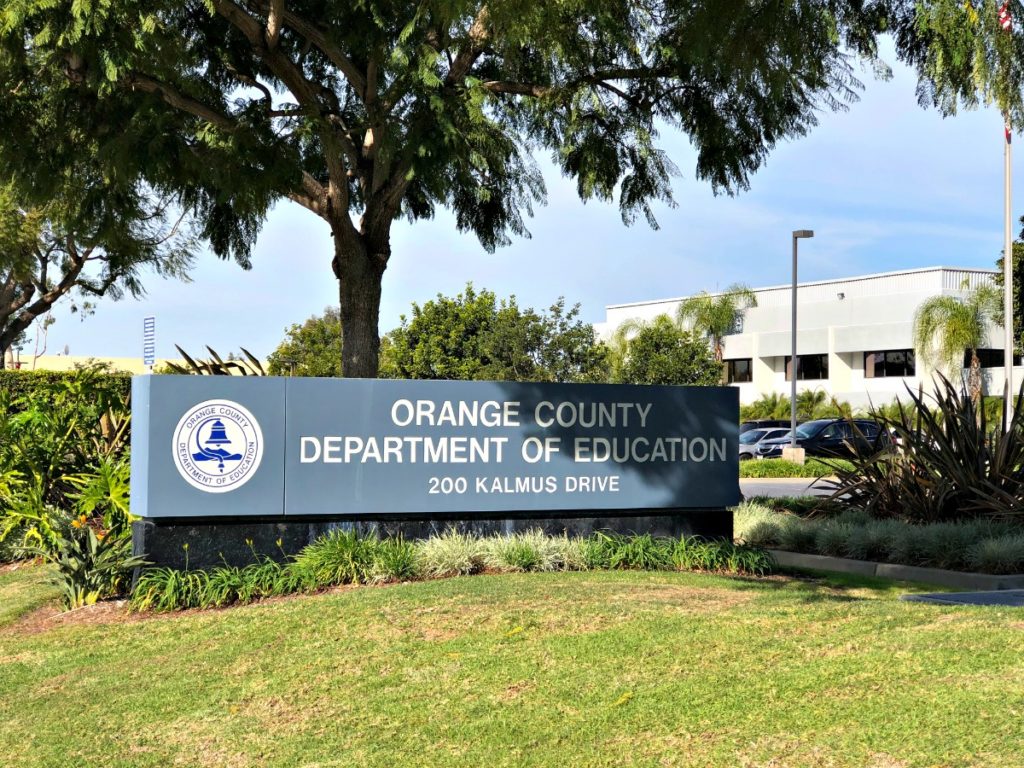California’s economy is in the midst of a downturn, with revenue declines expected to reduce the amount of funding for public schools over the next several years.
Despite these economic headwinds, the Orange County Department of Education is projecting to meet all financial obligations for the current year and the next two fiscal years, OCDE Associate Superintendent David Giordano told the Orange County Board of Education during its regular meeting on Wednesday, Dec. 6.

In addition to providing direct educational services and support for the county’s most vulnerable populations, OCDE supports local districts with services necessary for their operations. This includes professional development, high-speed internet access and security, legal and fiscal guidance, payroll services and student enrichment.
Like traditional school districts, OCDE and other county offices are required to certify their financial conditions twice each fiscal year, using current-year data and projections for the next two years. And like most districts, funding is tied directly to the state’s budget, which is a reflection of the health of California’s economy.
The latest assessment from the Legislative Analyst’s Office, a nonpartisan fiscal advisor to the Legislature, indicates that the state economy has cooled in the wake of the Federal Reserve’s efforts to combat inflation, which resulted in higher borrowing costs and reduced investment. These trends are evident in a number of economic indicators, including jobs data, consumer spending and income tax withholding.
In his presentation, Giordano, who oversees OCDE’s Administrative Services division, explained that California’s budget is primarily underpinned by revenue from personal income taxes, sales and use taxes, and corporate taxes. This year, a tax payment extension — the fall deadline was pushed back to Nov. 16 in counties impacted by natural disasters — is said to have obscured the size of the state’s revenue shortfall.
Impacts on Proposition 98
As of Dec. 6, state tax revenues for the fiscal year that ended on June 30 appeared to be approximately $26 billion below estimates from June. Estimates further projected a $32 billion reduction in revenues for 2023-24 and 2024-25, resulting in an overall revenue drop of $58 billion over three years.
These declines have direct implications for Proposition 98, which guarantees a portion of the state budget for education. For every dollar lost in California’s general fund revenue, the Proposition 98 floor would lower by nearly 40 cents. Given that, Giordano said a potential $58 billion revenue reduction over three years could result in a $22 billion reduction in school funding.
Whether education funding for the current year will be reduced remains to be seen, but the state’s statutory Cost-of-Living Adjustment estimate, or COLA, for next year has been downgraded from 3.94 percent to 1.27 percent.
At the same time, California faces rising costs in other areas, including pensions, as well as health and welfare benefits premiums. Meanwhile, persistent inflationary pressures add to the financial strain, impacting supplies and services, and the expiration of one-time federal and state COVID-19 relief funding removes temporary financial cushions.
Navigating future challenges
Using current projections, OCDE is expected to have a surplus of $15.2 million through June of this year based on expenditures of approximately $335 million, followed by a deficit of $2.4 million in 2024-25. The department projects a slight surplus the following year, with the caveat that economic conditions become harder to predict in the out years.
All of this adds up to a positive certification for OCDE’s first interim report, meaning the department is poised to meet all financial obligations for this year and the next two years.
“A critical measure of the department’s performance is the effectiveness with which it utilizes and generates resources,” Giordano said. “Our goal is to ensure that all fiscal and capital resources maximize educational opportunities for students.”
Additional budget presentations will come in February and March as OCDE updates its Local Control and Accountability Plans and prepares its second interim report based on the latest fiscal developments from the state.
The California Legislature has until June 15 to pass a spending plan for the new fiscal year, which begins July 1.
